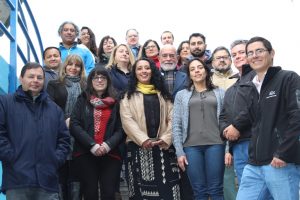Fisheries Under Management Areas Regime Monitoring Program Result’s Workshop
August 12th, 2019At Valparaiso’s Marine Sciences School from Pontificia Universidad Católica dependencies IFOP Fisheries Development Institute, conducted “Fisheries Under Management Areas Regime Monitoring Program Result’s Workshop, 2018”, which is developed by IFOP Management Areas Section, in order to show AMERB regime analysis results and properly advise the Fisheries and Aquaculture Undersecretariat .
The workshop was attended by professionals from the Fisheries and Aquaculture Undersecretariat Benthic Resources Unit, consultants, researchers and representatives of Non-Governmental Organizations, where the following topics were addressed:
Quality Information Management, corresponding to standard sampling formulation procedures and data delivery by Technical Organizations.
Information transfer automation, referring to the information transfer mechanism and management areas data research, carried out by the Fisheries Undersecretary Technical Organizations.
Environmental monitoring, carried out by IFOP through sampling network of structuring species of benthic communities (brown algae) and water temperature recording implementation.
Biological monitoring, where the evolution of biological-productive indicators for main resources extracted from the regime was presented.
Monitoring of socio-economic and organizational variables, focused on profitability evaluation at the level of management and fishermen areas, as well as determining fishermen organizations management capacity attached to AMERB regime.
Population connectivity locust research , through hydrodynamic modeling and simulation of larval dispersion of this species.
It is possible to consider that the regime has meant an important change in comparison to the administration models based on free access, recognizing in Artisanal Fishermen Organizations (OPA) their collaborative capacities to assume tasks of fishery resources management and the activity sustainable development propensity .

